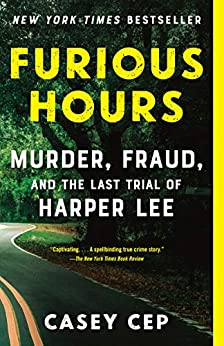More on this book
Community
Kindle Notes & Highlights
by
Casey Cep
Read between
April 5 - April 18, 2020
Men of the cloth may have more cause than most to avoid indiscretions, but they also have more opportunities to commit them.
Like more than a few preachers’, they learned, his private life bore little resemblance to the one his parishioners thought he was living, and no resemblance at all to those he extolled in his sermons.
their client was possibly the least likely poster boy for civil rights in the entire African American population of Alabama.
Of the $131,000 in insurance that the Reverend was known to have held on his second wife at the time of her death, Tom Radney managed to recover nearly $80,000 of it. For the Reverend Willie Maxwell, becoming a widower was proving to be a lucrative business.
The third Mrs. Maxwell was Ophelia Burns: the woman who had been indicted but never tried for the murder of the first Mrs. Maxwell.
Tom swore he’d never worship anywhere that preached God’s judgment without God’s love. He found a spiritual home in the Methodist Church, and for the rest of his life he said it was his faith that led him to believe in the equality of the races and the dignity of all people.
“Roses are red, Violets are blue. Two Kennedys are dead and so are you.”
“If you would be afraid of your wife telling it,” the Reverend advised Murphy, “I would suggest you put her in there and knock her off, too.”
writer from Alabama whose accent was still so strong she claimed to be afraid of consonants.
“More tears are shed over answered prayers than unanswered ones.”
The girls, meanwhile, were old enough to know who Lee was, and when one of them said to her, “I never read anything by you except To Kill a Mockingbird,” the author’s retort tickled them all: “Nobody else has either.”
“He might not have believed in what he preached, he might not have believed in voodoo,” she wrote of the Reverend, “but he had a profound and abiding belief in insurance.”
Nothing writes itself. Left to its own devices, the world will never transform into words, and no matter how many pages of notes and interviews and documents a reporting trip generates, the one that matters most always starts out blank.
Almost no one knew that one of the most celebrated authors in America lived there, hidden in plain sight, with “Lee-H” listed on the buzzer board. For a while, she shared the first floor with two musicians, known then as Daryl and John but soon to become famous by their last names: Hall & Oates, who had no idea their neighbor was a novelist, much less Harper Lee.
History isn’t what happened but what gets written down,
Harper & Row would have published Lee’s grocery list, she didn’t want anything appearing under her name that wasn’t as good as what she’d written before.


